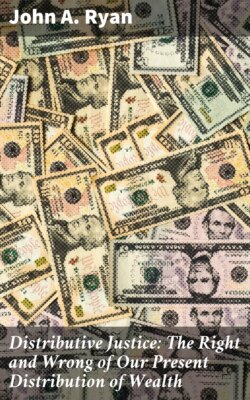Читать книгу Distributive Justice: The Right and Wrong of Our Present Distribution of Wealth - John A. Ryan - Страница 32
На сайте Литреса книга снята с продажи.
CHAPTER VI
LIMITATIONS ON THE LANDOWNER'S RIGHT TO RENT
ОглавлениеTable of Contents
The chapters immediately preceding have led to the conclusion that private ownership is the best system of land tenure, and that the individual has a natural right to participate in its advantages. Although this system confers upon the individual owner the power to take the rent of the land, we are not logically debarred from raising the question whether this power is a necessary part of the moral rights of landownership. Does the right to own a piece of land necessarily include the right to take its rent? By what ethical principle of distribution is the landowner justified in appropriating a revenue in return for which he has performed no labour, nor made any sacrifice? This is unquestionably what happens when a man hires out his land to another. And in conditions of perfect competition, those owners who operate their own land are fully remunerated for their labour in the form of profits. Over and above this sum they receive rent, the payment that they could get from the land if they were to let its use to tenants. In the normal situation, therefore, rent is a workless income. On what moral ground may it be taken by the landowner?[47]
The fact that we have rejected the Single Tax and the confiscation of rent by the community, does not of itself commit us to the conclusion that the private owner has a moral right to receive rent. We have condemned the State appropriation of rent on the assumption that it would take place without a similar confiscation of interest. Such discrimination would be grossly unfair; for it would cause land values to sink to zero, while leaving the value of capital substantially undisturbed. To carry out such a programme would be to treat property owners unequally, to penalise one set of beneficiaries of "workless" incomes, while leaving another set untouched. Consequently, the State is not justified in confiscating rent unless it is justified in confiscating or prohibiting interest; and the landowner is as fully justified in taking rent as the capital owner is in taking interest. The contention of the Single Taxer that ownership of the former kind is morally wrong, while ownership of capital is morally legitimate, has already received sufficient discussion. The specific question remains, therefore,—whether the landowner and the capitalist are justified in receiving and retaining their "workless" incomes.
Inasmuch as the principles and pertinent facts involved in this question can be more effectively and more conveniently discussed in relation to interest than in relation to rent, the solution will be deferred to the chapters on interest. Assuming provisionally that the outcome of the discussion will be favourable to the claims of the landowner, let us inquire whether he always has a moral right to all the rent. The parallel question regarding the capitalist will be considered in connection with the right of the labourer to a living wage.
